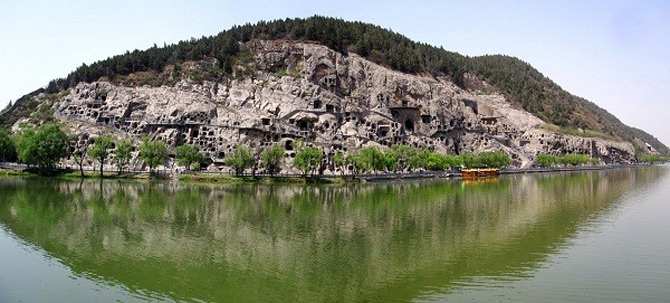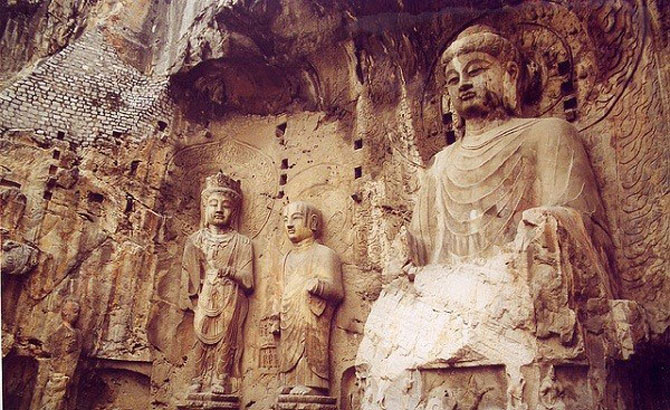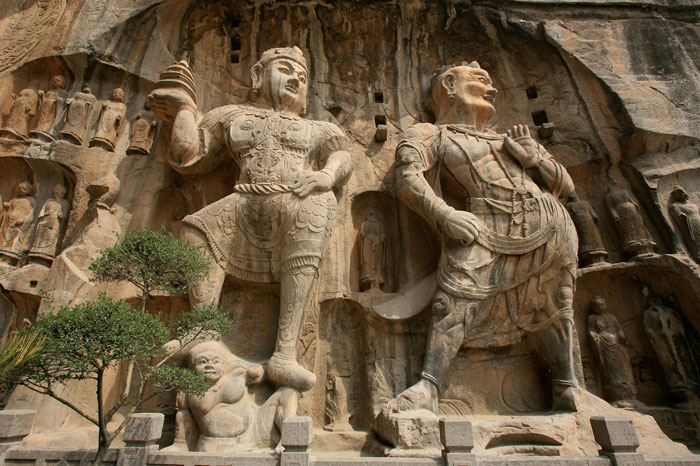Longmen Stone Cave - World Cultural Heritage in China
Unesco's Science, Education and Culture Organization has recognized China's Longmen Stone Cave as a World Cultural Heritage in 2000.

Longmen stone cave is located on a cliff, standing on the Long Mon valley, in the suburbs away from Lac Duong city in Ha Nam province, about 12.5 km south of the center. Because this is a cliff where two east-west sides face each other, there is the Doan Ha river flowing down below so it looks like a gate. This is an important traffic intersection, and it is also a charming landscape, a blue water lake, a pleasant climate that attracts the writer and the visitors to sightseeing excursions. When Long Mon cave was found and excavated, the area became more famous and from that day until now, this place has been attracting more and more visitors.

Along with Mac Cao cave in Cam Tuc province, Van Cuong cave in Son Tay province, Long Mon cave is considered the treasure of precious sculpture of China . According to documents recorded, Longmen cave began to be built from the Han Van De period (471 - 477 years), over 400 years of completion, now has more than 1500 years of history. Longmen stone cave is about a kilometer long. According to research by Chinese scientists, Long Mon Dong has 2,345 caves and niches, 2,800 carved verses, 50 Buddha towers, 100,000 Buddha statues. Including Tan Duong cave, Phung Tien pagoda and Co Duong cave are the most typical.

The cave between Tan Duong is a typical work of the Northern Wei period (386 to 512). This cave was constructed during 24 years of completion. The cave was carved in the longest time, there were 11 large Buddha statues in the cave. Shakyamuni is the main statue in which, this statue is carved very naturally with an extremely delicate Buddha face, considered a masterpiece of stone sculpture art of the Northern Wei period. Before the Buddha statue Shakyamuni has two healthy male lions carved. Two standing disciples and two Bodhisattvas on the right and on the left of the Buddha Shakyamuni statue also have their faces sculpted with great grace and elegance. In the cave, there are many statues of Bodhisattvas carved and statues of disciples who are listening to Buddhist scriptures, looking very lively. The statue of Phi Thien Fairy on the top of the cave is nicely portrayed.


Phung Tien Pagoda is the largest cave of Long Mon cave cave complex, representing the style of stone carving art of the Tang Dynasty (618-904 year). The width and length of the temple are more than 30 meters. All the sculptures in Phung Tien Pagoda are a very fine artistic body, in which the statue of the Buddha Lư is a great masterpiece of art. The total height of the Buddha's statue is about 17 meters, the figure of the plump buddha is elegant and very lively. Her intellectual gaze from above brought down, meeting the gaze of everyone to admire, making everyone feel the self-centered vibration, artistic appeal.


The Old Cave is the earliest carved cave in the whole Longmen cave complex, the richest of which is a representative cave of the Northern Wei period. The ancient cave of Yangtze has a lot of Buddhist examination, the great Buddha's examination has all the words, record the author's full name at that time, as well as the years and years of its birth . All artifacts These are valuable documents for studying the calligraphy and sculpture of the Northern Wei period.


Longmen's twelve works are milestones of Chinese calligraphy history, most of them are gathered in this cave. With proficient neat letters, strong temperament, this place is the essence of ancient letter art.
Up to now, Long Mon cave has kept many important documents on the history and religious art, calligraphy art, music, costumes, architecture . So Long Mon stone cave complex is still an institute. Museum of large stone sculpture art of China.

On November 30, 2000, the Longmen stone cave complex was included in the World Cultural Heritage List because it is a sculpture of many Chinese cultural and historical meanings. It can be said that this monumental area is a clear evidence for talent and creativity, changing the nature of Chinese people in particular and humanity in general.
- Van Cuong stone cave
- Macao stone cave - China
- Art stone cave at Tsodilo hill
- Da Tuc stone carvings
- Ajanta cave temple - India
- Di Hoa Vien - World Cultural Heritage in China
- Secrets - World Cultural Heritage in China
- Bethlehem Church - World Cultural Heritage in Palestine
- Thien Dan - World Cultural Heritage in China
- Stone carvings in Tamgaly archaeological area
- Stone carvings in the Altai range
- Cultural landscape Hallstatt-Dachstein in Salzkammergut region
 Suzhou classic bonsai garden - China
Suzhou classic bonsai garden - China Chau Nguyen Dynasty
Chau Nguyen Dynasty Thai Son Mountain - World Wonder
Thai Son Mountain - World Wonder Ancient villages of Shirakawa-go and Gokayama
Ancient villages of Shirakawa-go and Gokayama